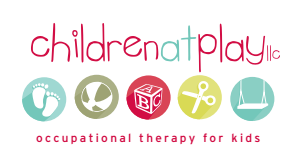Play-Based OT to Prepare for Extracurricular Activities
Parents often recognize that their child could benefit from activities to “burn energy,” improve coordination, or practice rule-following and social skills. So, they start activities such as gymnastics, soccer, and karate. For many kids, these activities are wonderful extracurriculars that support their physical and mental growth. For some kids, these activities compound their frustrations. All kids will have frustrations and tough days. Regular meltdowns at an activity can indicate that the child doesn't have the assumed foundational skills.
Team Sports
Team Sports such as soccer, basketball, baseball, football, lacrosse, and others can be extremely difficult for many kids. They require foundational motor planning, coordination, balance, and strength skills that many kids develop at their own pace. The age or size-based categories used in sports often place neurodiverse kids in groups that don’t match their motor skill sets. The kids we help often find simply moving and being in their own bodies challenging. Moving their bodies in reaction to another child's actions is extremely difficult and often out of reach for them. (ie. moving to receive a ball where the other kid kicks it).
Team sports are focused on improving a few particular motor skills through repetition, not on meeting the sensory needs of kids. Sport-specific motor skills primarily maintain an upright position while repeating limited motions such as swinging your arms with a bat or running. Occupational therapy involves various body positions, such as upside down, rolling, spinning, crawling, etc, and is much more activating to the nervous system. We also have the flexibility in the 1-1 setting to determine and meet their movement and sensory needs for that day. OT’s activities are designed to meet a kid's sensory needs while building whole-body muscles and postural control.
What activities are best to support the work done at OT?
While each child, class setting, and instructor is different, many can be a good fit. In general, any activity your child LIKES, shows interest in, and enjoys going to is probably a good fit for them. We recommend asking for instructors who are sensory-friendly/Neuro diversity-affirming whenever possible. Below are some activities that neurodiverse kids often enjoy, with some notes to help you determine which might be the best fit for your kid’s unique needs, skills & preferences.
Swimming lessons (1:1 or small group - 1:3 at most)
PROS: great sensory input, life skill, and direct instruction tailored to your child’s needs.
CONS: some kids fear water and have sensory sensitivities for getting water on their face.
Gymnastics
PROS: the focus is on yourself and your body, great sensory input, they will move their body in different positions to develop foundational skills & strength
CONS: the big gym with multiple classes going on sometimes is too much, waiting can be difficult, and motor tasks can sometimes be too challenging for kids with motor planning challenges
Dance
PROS: the focus is on yourself and your body, a good opportunity to work on motor planning
CONS: tap classes can be loud, classes are often large and don't offer a lot of support, and sometimes not enough flexibility for neurodiverse needs.
Martial arts classes
PROS: the focus is on yourself and your body (or one other person, if in jujitsu or wrestling), with a great variety of sensory input (proprioceptive, vestibular, and tactile)
CONS: difficult for kids with tactile defensiveness (uniform and being touched by others).
Library classes and story times
PROS: you can stay with your child and provide co-regulation, direct support, and take breaks as needed. Optional socialization time after the event. Many local libraries offer sensory-friendly story times.
CONS: younger kids, who are typically more unpredictable and louder, are often in attendance, and events can be crowded.
Music Classes
PROS: Usually, you can stay with your child and provide co-regulation, direct support, and take breaks as needed. Optional socialization time after the class.
CONS: it can be difficult for kids with auditory defensiveness.
Play dates at parks or home
PROS: you can tailor the environment and activities to meet your child’s interests, can tailor the length of the activity and the expectations, and can provide outdoor activities. You can choose children that your child is already connected with or has similar interests to.
CONS: sometimes, there is too much social demand for the child.
If your child regularly isn’t enjoying or participating in age-appropriate activities, then the "Just Right Challenge" approach of play-based pediatric occupational therapy may be what they need. OT builds children's balance, focus, coordination, frustration tolerance, and other foundational skills so they have the tools and capabilities they need for fun activities.
One of the primary goals of pediatric Occupational Therapy is for kids to be able to graduate OT and participate in a variety of activities.
If you’d like to share a suggestion for a local Annapolis-based kid’s activity that is neurodiverse affirming, please write a comment below!


